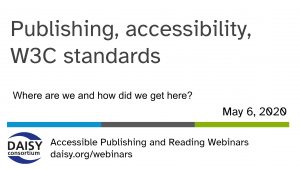Publishing, Accessibility, W3C Standards—Where Are We and How Did We Get Here? (W)

In our series of free weekly webinars May 6th saw a session focused on publishing technology at the W3C, the EPUB eco-system, and baking in accessibility within digital content. Behind the scenes of any technology you will find that a significant amount of effort invested over many years has shaped where we are today. This webinar reflected on the EPUB 3 journey to become the most popular and most accessible digital publishing standard in the world.
This page contains:
Full Video of the Webinar
Speakers
- Richard Orme, The DAISY Consortium—host and chair
- Bill Kasdorf, Publishing Technology Partners
- Luc Audrain, Inclusive Publishing Consultant (just retired from Hachette)
- George Kerscher, The DAISY Consortium
Session Overview
Bill Kasdorf opened this webinar with an overview of book production workflows—the evolution of publishing technology has enabled “accessibility to be more accessible than ever”. Today, every step of the workflow is digital and assistive technology benefits from the interoperability and open standards that are in play for digital files, systems and devices. Web technology is the fundamental basis for EPUB 3, giving publishers the opportunity to produce born accessible EPUB 3 as a standard output from their workflows. But Bill stressed that whilst this is possible:
You have to use the tech properly!
EPUB 3 doesn’t guarantee accessibility, rather it offers “accessibilityability”.
Luc Audrain walked us through a history of EPUB 3 which is now hosted within the Publishing@W3C organization who’s focus is on creating a global EPUB 3 ecosystem. The revision of the EPUB 3 spec and upgrade of EPUBCheck were the initial focus and now it is time to create the best EPUB 3 ecosystem for born accessible content, with tools such as EPUBCheck, Ace by DAISY and the EPUB 1.0 Accessibility specification.
George Kerscher spoke about integrating accessibility into all aspects of publishing and reading:
Accessibility is not a frosting spread on a cake; it must be baked in.
Authoring and publishing production software can integrate Ace by DAISY, the SMART tool and the DAISY Knowledge Base into their working practices and these have been built from DAISY’s years of experience and participation in digital publishing initiatives.
Alongside these tools and best practices, publishers need to take advantage of conformance and discovery metadata if they are to communicate the good work they are doing. The forthcoming User Experience Guide for accessibility metadata will help libraries and print disabled readers to buy born accessible EPUB 3 content and to have access at the same time, in the same format and at the same price as all other readers.
If you are interested in the future of EPUB and publishing standards then the second part of this webinar is worth registering for. The future of accessible publishing and standards – where are we going? will take place on June 3rd, 2020
Related Resources
- PowerPoint slide deck (4.2 MB)
- Full transcript Word document (33 KB)
Links mentioned in the webinar:

